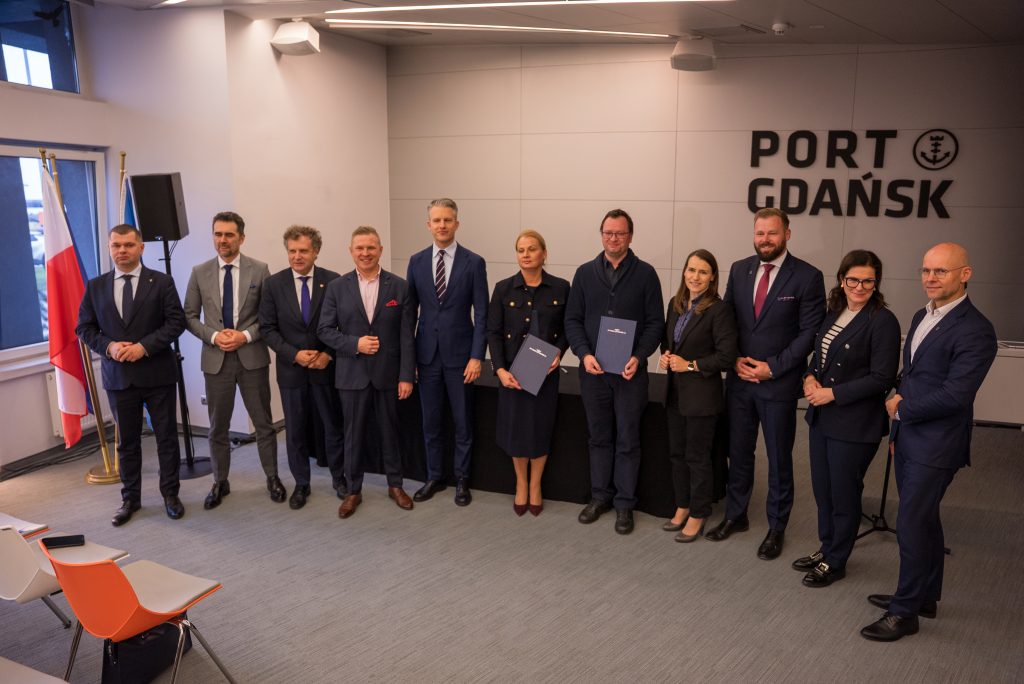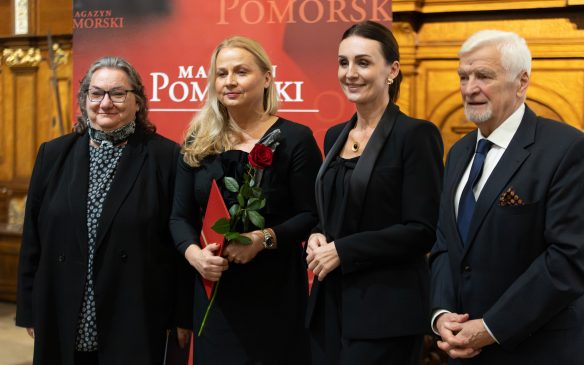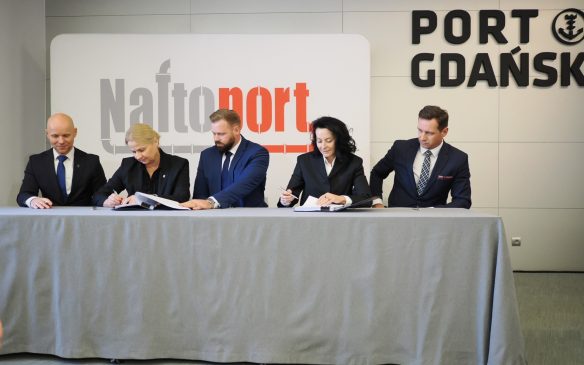Strategic partnership: PLK and Port of Gdańsk join forces to expand rail access to the port

Polskie Linie Kolejowe S.A. and Port of Gdańsk Authority SA have signed an agreement on the expansion of access infrastructure to the deep-water cargo handling terminals of the Port of Gdańsk located on the island of Stogi. The planned investment is strategic for the development of the port and, consequently, for the Polish economy.
Rail is the most efficient, safe and environmentally friendly means of transporting goods. A consistent increase in its share in freight transport is one of the priorities of PLK SA.
These goals are in line with the signing of the agreement with Port of Gdańsk Authority SA concerning the development of preliminary documentation for the expansion of rail and road access infrastructure to the existing and planned deep-water terminals in the Northern Port of Gdańsk.
‘No one needs to be convinced of the crucial role of seaports in the development of the Polish economy. In order to make them more competitive, it is necessary to plan further investments now, including those related to improving capacity on railway lines. That is why we are all the more pleased with the agreement between the Polish Railways and the Port of Gdańsk Authority SA’, said Arkadiusz Marchewka, Deputy Minister of Infrastructure, during the event.
The implementation of this task is of strategic importance in terms of strengthening the economy and national security by increasing the logistics potential of the Port of Gdańsk and the capacity of railway lines managed by PLK SA. In 2024 alone, the Port of Gdańsk dealt with over 355,000 railcars (a number that only applies to business partners of ZMPG). All rail transport, which carries traffic from the deep-water part of the port, is carried out via a single bridge.
‘The agreement signed between the national railway network operator and the Port of Gdańsk is an example of successful partnership and sensible planning of the infrastructure investments necessary for cargo transport’, said Piotr Malepszak, Deputy Minister of Infrastructure.
Jacek Karnowski, Deputy Minister of Funds and Regional Policy, emphasised that PLN 200 billion from EU funds is to be spent next year.
‘The Ministry of Infrastructure is probably the largest ministry that uses the largest share of these funds’, he added. ‘Not only from the Polish funds, but also from the CEF (Connecting Europe Facility)’.
Now it’s the ports’ turn!
Dorota Pyć, president of the Port of Gdańsk, has repeatedly emphasised the need to build a second bridge or tunnel leading to the port island. This is where the specialised deep-water terminals are located, and they account for over 80 per cent of cargo handling in the port. The functioning of such facilities as Naftoport, Gaspol and the Northern Port is crucial for the country’s energy security, while the activities of Baltic Hub constitute a strategic pillar of Poland’s economic and logistical development, strengthening Gdańsk’s position as one of the most important ports on the Baltic Sea.
‘The rapidly expanding the Northern Port requires new railway infrastructure – additional tracks, sidings and increased capacity at the Northern Port station. The current network is already becoming a limiting factor in our development. Ports cannot develop independently of the railway network. That is why the development of intermodal connections is one of the pillars of the strategy we are currently developing. Today’s agreement with PLK is not just a plan – it is a practical response to the challenges facing us and the entire Polish logistics sector’, said Dorota Pyć, President of the Port of Gdańsk, during the event.
The implementation of the investment through the construction of alternative access infrastructure to the Port of Gdańsk, including new bridges or tunnels, is going to contribute to the improvement of rail traffic both within the Port of Gdańsk and its hinterland. The investment will include the construction or upgrade of port infrastructure and access infrastructure to the Port of Gdańsk.
‘We are aware of the importance of rail transport in the daily functioning of Polish ports on the Baltic Sea. That is why we are planning and implementing investments that improve the capacity on routes to the quays and ensure fast, efficient, safe and environmentally friendly rail freight transport’, said Marcin Mochocki, member of the management board and director of investment implementation at Polskie Linie Kolejowe S.A. ’It is extremely important to connect the beating heart of the Polish economy, the seaports, with the bloodstream of the economy – the railway network managed by PLK.
Aleksandra Dulkiewicz, Mayor of Gdańsk, was also present at the ceremony.
‘I am very pleased that an alternative exit and entry road to the port will be built. It will take some of the burden off the port island, a truly unique place. We can already see how it is changing. Further changes must be prepared in a sustainable manner – on the one hand, we must take care of the strategic security of Gdańsk and Poland, and on the other, give the residents and lovers of the port island a reason to still love this place’, said Aleksandra Dulkiewicz.
Three stages of the investment
The purpose of the partnership between PLK SA and ZMPG SA is, first of all, the development of a feasibility study (stage I in 2026–2027), and then the commencement of work on the design documentation in 2028 (stage II), the preparation of which shall enable the commencement of the investment in railway infrastructure accompanying the expansion of the Port of Gdańsk (stage III) by 2034, involving the upgrading of existing railway lines, their electrification, and the construction of new sections of lines to enable rail transport as part of the project ‘Improvement of rail and road access to current and future deep-water cargo handling terminals located in the Northern Port’. The commencement of construction work can begin once the necessary funds have been secured and the necessary administrative decisions have been obtained.
Greater capacity on the tracks to the ports in the Tri-City
Investments carried out and planned by PLK SA on railway lines leading to the ports of Gdańsk and Gdynia are a response to the need to increase their transport capacity. Between 2019 and 2024, rail access to both ports has been improved, with over PLN 3 billion net allocated from the CEF – the Connecting Europe Facility financial instrument. As a result, longer and heavier trains now arrive at the quays, and they can carry more goods. Last year PLK SA began the upgrade of the 201 ‘Bydgoszcz – Tri-city’ railway line (in 2021–2024 work was carried out on tangential lines), which is of significant importance for the growth of the port and Gdynia’s potential. In September of this year, a tender procedure was announced for the design and execution of construction works for the project ‘Increasing the capacity of the Tczew – Gdynia route: section Pszczółki – Pruszcz Gdański’. The construction of an additional track will improve capacity on the main exit from the Tri-City, including to the Port of Gdańsk, and allow the separation of freight and other train traffic from long-distance connections. The completion of the work is planned for 2030.



